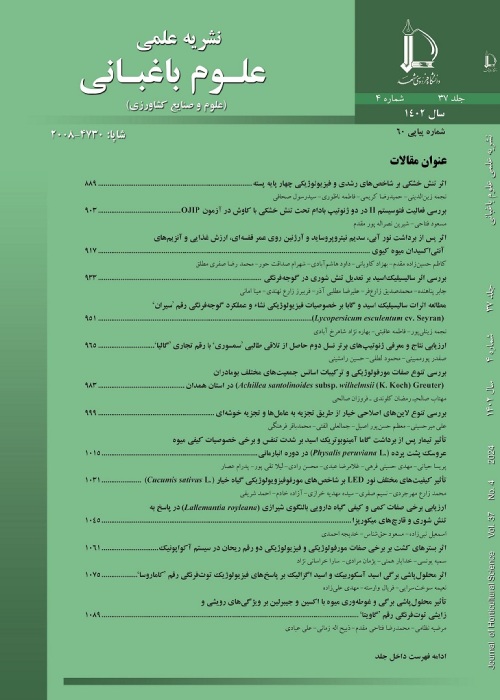Effect of some Organic Mulches on Cold Resistance of Aquilegia sp.
Each year, with the onset of cold season and severe drop in temperature, the probability of frost bite and frost damage is a problem for landscaping plants. Many plant species, especially tropical and subtropical species, are damaged when exposed to frostbite, causing damage to their cells, tissues, and organs. Research has shown that by altering membrane properties during cold stress, metabolic balance is disturbed and with the increase in toxic metabolites, secondary damage to the plant can occur. At low temperature, decreases the efficiency of energy transfer to the center of the photosystem II. In addition, low temperatures are the main cause of the formation of reactive oxygen radicals. Also, lowering the temperature in the presence of light, due to the imbalance between light absorption and photosynthesis, increases the risk of light oxidation. Low temperature also reduces the activity of Rubisco. The amount of free proline in many plants increases significantly in response to environmental stresses such as frost stress, and stabilizes the membrane during cold stress.On the other hand, the use of some organic materials such as organic mulches increase temperature of the soil, and thus helps plant from frostbite. Use of organic mulch is widespread in agriculture due to the positive effect in soil temperature, weed control and moisture retention. Also, these mulches are effective in height, growth and flowering, early maturity and total yield of the products. Mulches in the warm seasons reduces soil temperature. Use of mulch can also help plants to withstand frostbite. Organic mulch decomposition in appropriate temperature and humidity conditions, liberates the nutrients gradually and provides for root plant and microorganisms of the soil. Organic mulches can reduce the effect of salt toxicity on plant growth and actively increase soil desalination. The most important benefit of mulch is the increase in soil temperature in the seed area, which accelerates the growth and yield of the product. Use of straw as mulch resulted in accelerated germination in cucumber. Use of straw mulch leads to an increase in temperature at night, thus protecting plants from temperature stress that has a positive effect on the growth and development of wheat.
In order to investigate the effect of freezing stress and using different types of organic mulch for Aquilegia plant, this experiment was conducted as a factorial experiment based on completely randomized design with four replications at Faculty of Agriculture, Ferdowsi University of Mashhad. The experimental treatments included four types of mulch (control (without mulch), 50% soil + 50% manure, 50% soil + 50% leaf needle + 50% soil + 50% rice bran) and five levels of freezing temperature (0, -5, -10, -15 and 20). Characteristics such as percentage of electrolyte leakage, relative water content, chlorophyll index and total chlorophyll, leaves number, leaf area, plant dry weight and proline leaf content were considered.
The results showed with decrease of temperature from 0 to -20 °C, stem diameter, leaf area and leaf number in bran mulch treatment decreased by 42.6%, 73.4%, 21.2% respectively, also stem diameter, leaf area and leaf number in mulch of leaf needle were 35.2%, 9/64%, 47.6%, in manure mulch were 20.20%, 46.4%, 7.8% and in the control of mulch decreased, 32.8%, 79.7%, 30.7%, respectively. At -5 °C, the amount of proline was 26% in the leaf and at -20°C, the amount of proline increased 50% compared to the control. Also, the lowest proline (0.73 μmol / g fresh weight) was obtained from the plants that treated with bran mulch. With application of, electrolyte leakage reached 63.6%, 68%, 61% and 57% in control conditions bran, needle and manure, respectively. In short, the least electrolyte leakage was observed in manure. On the other hand, when temperature dropped from 0 to -20 °C, the percentage of electrolyte leakage increased in Aquilegia. Relative water content of the leaf were 24% at 0°C, 38% at -15 °C and 23% at -20 °C. In terms of non-use of mulch, the relative water content was 36% and reached a 42% and 40% with application of manure and needle using mulch. By measuring the total carbohydrate found in Aquilegia leaf, it was observed that the amount of this trait was increased under frost stress. In general, although frost stress reduced the morphological traits of Aquilegia, use of organic mulch resulted in the improvement of these traits. The best results were observed in manure mulch.
- حق عضویت دریافتی صرف حمایت از نشریات عضو و نگهداری، تکمیل و توسعه مگیران میشود.
- پرداخت حق اشتراک و دانلود مقالات اجازه بازنشر آن در سایر رسانههای چاپی و دیجیتال را به کاربر نمیدهد.



